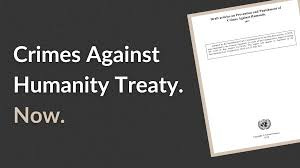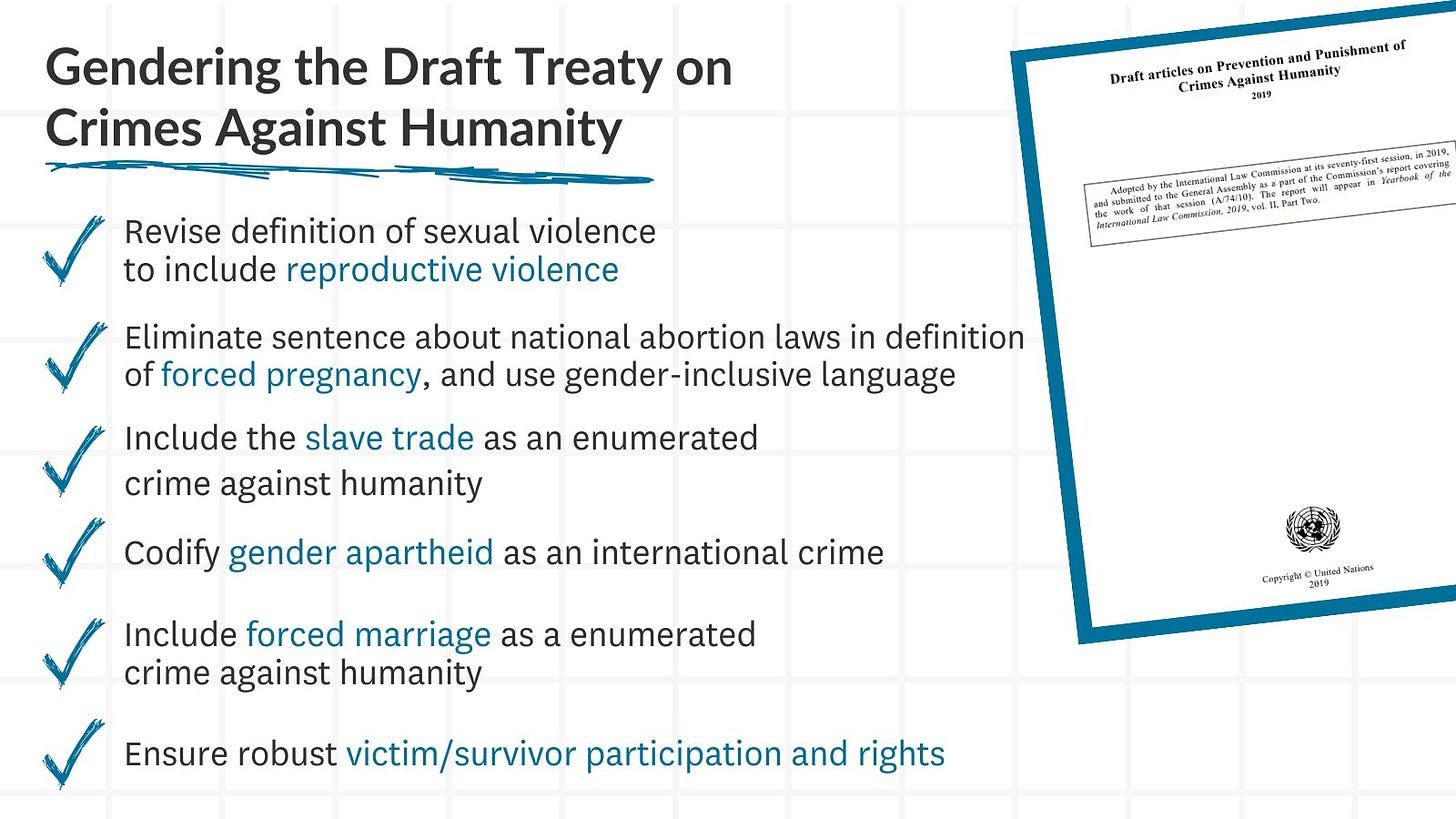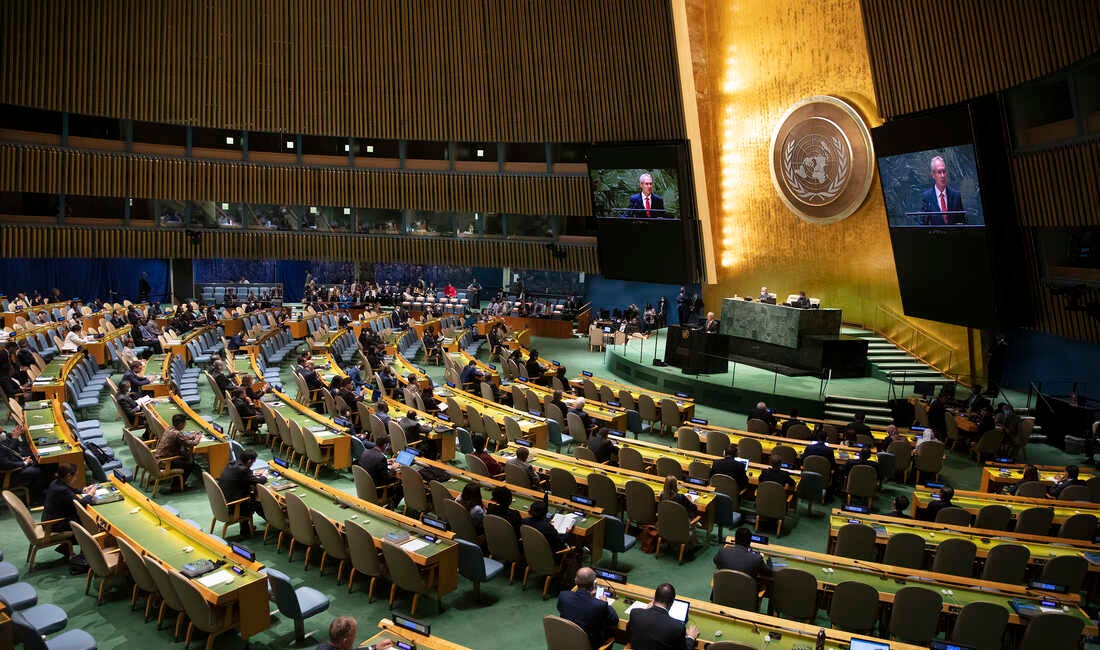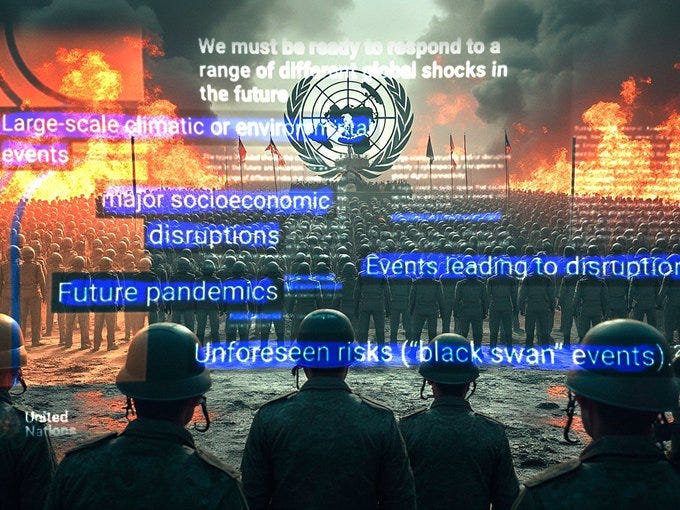Result Of The Worlds First Crimes Against Humanity Treaty Vote On October 10, 2024 - Are we ever going to make it binding duty to PREVENT crimes against humanity?
Concluding Debate on Crimes against Humanity, Sixth Committee Speakers Highlight Divergent Views on Codifying Draft Articles, Stress Core Issues Still Unresolved
A Shiny New Crimes Against Humanity Treaty UPDATE:
Hey everyone - here is the update of what happened a week and a half ago in the worlds first vote ever for negotiating a crimes against humanity treaty:
Long story short - THEY ARE GOING TO DO IT AND THE DEADLINE IS 2 YEARS! THANK GOD.
And it really is a long story of how MILLIONS of years went by with NO treaty ever made to prevent crimes against humanity.
THANK YOU TO EVERYONE WHO SIGNED OUR REQUEST TO NEGOTIATE! We once again all got heard by the right people in time, and we got our way.
Below you will find in depth information on this once in a lifetime treaty negotiations and how different countries are thinking about it…
To us, we find it really interesting how each country had their own take.
We have NO idea how they will ever agree - but countries and civil society really needs to negotiate this particular treaty for the sake of future generations.
…and yes, if you are like us and concerned that the UN is sketchy, IDEALLY, we can have a version that oversee’s UN’s commitments to prevent crimes against humanity by civil society, which believe it or not, is the AWESOME direction this treaty negotiation is actually taking : ) Civil Society is part of this initiative WITH the States.
UN’s here and we can’t stop them overnight, so we better restrain them!
It’s worth mentioning that the law of crimes against humanity -as it is now- refers to the timeless definition of “man and woman”, so of course, the bulk of civil society lobbied to change man and woman to “gender” to reflect woke BS (they say to adhere to “current reflections” in society).
The Commission decided not to include the definition of “gender” that was contained in article 7, paragraph 3 of the Rome Statutes, which made many parties upset.
Let’s change the world folks! Lets make it a BINDING DUTY for all governments and international organizations like UN, WEF & WHO to prevent crimes against humanity.
We want to dismantle the UN ORGS, but while they stand, they should be bound to this treaty!
Costa Rica and 12 countries call this treaty URGENT to give them full power to use their Universal Jurisdiction!
Certain provisions of the draft articles expand the scope of universal jurisdiction, which is a principle on which the international community is divided.
The reason we care so much and got involved is that we will need to add parts to the current treaty draft in order to make International Organizations ALSO responsible for the prevention of crimes against humanity!!!! It’s IMPORTANT! No one wants crimes against humanity!
The trailer video for why we need this treaty in case if you haven’t seen it yet:
The Variety Of Views Is Fascinating, Especially Considering We Are Talking About Duty To Prevent Mass Atrocities!
October 11, 2022 - The thorny nature of developing new international law amongst diverging State views again came to the fore in the Sixth Committee (Legal) on October 10, as delegates concluded their debate on the future of the International Law Commission’s draft articles on crimes against humanity. (For background, see 2022 Press Release GA/L/3660.)
The representative of Algeria, urging those present to refrain from imposing legal principles that do not enjoy universal approval, expressed regret that the International Law Commission’s draft articles on crimes against humanity do not reflect the current state of international law or international customary practice. While a convention governing such crimes would allow each country to exercise its criminal jurisdiction over crimes against humanity, he noted that core issues remain ambiguous and require further negotiation.
On that point, the representative of Saudi Arabia expressed concern that the draft articles’ introduction of new definitions might cause confusion, spotlighting the need to standardize terms such as “slavery”, “torture” and “enforced disappearances”. He also noted that certain provisions within the draft articles expand the scope of universal jurisdiction, a principle on which the international community is currently divided.
The representative of Syria highlighted another complication, relating to the appropriate legal description of the new ways some States have adopted to provoke conflict across the world. Questioning what the international community would call a siege imposed on a whole people or unilateral coercive measures that create food insecurity, he also pointed out that some States seek to justify their direct interference in conflicts using the excuses of combating terrorism or promoting democracy.
The representative of Mauritius underlined the importance of drawing lessons from other international mechanisms in which only specific groups of persons were being targeted by international prosecutors. Such different perceptions can only breed resistance against a global treaty, making implementing such an instrument more difficult. She therefore emphasized the urgency of having a treaty in place “as quickly as possible”.
The representative of Malaysia, noting that this is the fourth time the draft articles are before the Sixth Committee, expressed hope that they will be examined prudently to ensure that further work does not overlap with existing regimes but, rather, complements them. She reported that Malaysian criminal law provides for the prosecution of perpetrators of crimes against humanity, and that its international cooperation in this regard is governed by national legislation pertaining to extradition and mutual legal assistance in criminal matters.
The representative of Belgium, noting the different views expressed by States, said that an ad hoc committee with a clear mandate and well-defined timetable would provide an appropriate framework for discussing different approaches. She also added her support for the mutual-legal-assistance initiative, which focuses on the creation of a modern, detailed framework for mutual legal assistance and extradition relating to genocide, war crimes and crimes against humanity. This project is complementary to the draft articles, and the two should coexist and be developed in parallel, she emphasized.
The representative of Sri Lanka, however, observed that the phrase “crimes against humanity” suggested acts that aggrieve not only the victims, but all human beings, emphasizing that such offenses violate “the core humanity we all share that distinguishes us from other natural beings”. Noting that law traditionally distinguishes between crimes against categories such as persons, property, the public order and morals, he underscored that the defining feature of crimes against humanity is the value they injure, namely, “humanness”.
The Sixth Committee also considered its agenda item on the administration of justice at the United Nations today, taking up reports by the Secretary-General and the Internal Justice Council on the matter (documents A/77/156, A/77/151 and A/77/130).
The representative of Jamaica noted that, despite numerous challenges imposed by the COVID-19 pandemic, the United Nations internal justice system continued to function using flexible work arrangements. He also welcomed the launch of the Caselaw Portal and Electronic Digest developed by the Office of Administration of Justice, which – now further enhanced with French-language capability – will serve to enhance the accessibility of cases addressed by the system.
The representative of Côte d’Ivoire similarly welcomed the increased multilingualism in the various departments of the United Nations Dispute Tribunal and Appeals Tribunal, encouraging the translation of important judicial documents into the Organization’s six working languages. She also spotlighted the new “360-degree appraisal” method, which allows staff members to provide feedback to their supervisors. This will serve as a “guarantee of transparency”, she noted.
The representative of the United States underscored the need for transparency in the internal justice system so that United Nations staff, their representatives and the General Assembly can better understand how the Tribunals are carrying out administrative justice.
He also highlighted the importance of the informal system for dispute resolution, which seeks to prevent and resolve staff conflicts before they mature into formal disputes.
IOJ’s 11-11 Nuremberg Hearing against WHO shots authorizations was ORDERED by the Presidents office and REALLY still needs much more support! We are only 15% to the Attorney fees and yet the hearing is around the corner for the Presidents office to hear Dr. Yeadon and Sasha Latypova in an informal dispute setting that could really move mountains - Supporters of THIS mission are supporting the ONLY way to win and we cannot get this done without you! Please share and please care.
The WHO Internal Oversight sent IOJ’s case to “national authorities” to STOP the PCR & vax globally - You Can Help!!!
All contributions WILL make a real difference IN TIME!
On that point, the representative of Switzerland highlighted the insufficient use of mediation as an informal dispute-resolution mechanism to resolve workplace conflicts. Emphasizing that mediation must be promoted to a greater extent for all categories of personnel, she also stated that a fair, effective internal system for the administration of justice ‑ accessible to all ‑ lends greater credibility to the Organization’s commitment to equal access to justice and the rule of law.
At the end of the meeting, the Sixth Committee took up its agenda item on the United Nations common system, in which the Committee was invited to consider the legal aspects of the Secretary‑General’s report titled “Review of the jurisdictional set-up of the United Nations common system” (document A/77/222).
Also speaking on crimes against humanity were representatives of China, Nigeria, the Netherlands, Tunisia, France, Bolivia, Greece, Türkiye, Pakistan, Indonesia, Israel, Romania and Sri Lanka. The observers for the State of Palestine and the Holy See also spoke.
Also speaking on the administration of justice at the United Nations were representatives of Morocco (for the African Group), New Zealand (also for Australia and Canada), Cameroon, Cuba, the Netherlands, China and Mexico. A representative of the European Union, in its capacity as observer, also spoke.
The Sixth Committee met at 10 a.m. on Wednesday, 12 October, to commence its debate on the scope and application of the principle of universal jurisdiction.
Crimes against Humanity
GENG SHUANG (China), associating himself with the Group of Friends in Defence of the Charter of the United Nations, pointed out that, despite the divergence of views, discussions in the Sixth Committee regarding a dedicated convention on crimes against humanity reflect the issue’s high priority for the international community and should be continued. Highlighting several such points of divergence ‑ including the definition of crimes against humanity, the application of universal jurisdiction, and the relationship between such a convention and domestic law ‑ he recalled a Chinese proverb that said, “sharpening the axe will not delay the task of chopping wood”. Further consideration, therefore, will gradually bridge differences and pave the way for subsequent negotiations. Adding that the Committee’s tradition of consensus must be respected, he noted that some delegations introduced a draft resolution on their own and indicated they were prepared to put it to a vote. This is “not constructive at all,” he said.
Ms. AJAYI (Nigeria), associating herself with the African Group, called for continuous efforts to combat impunity for perpetrators of crimes against humanity. For its part, Nigeria has enacted laws and introduced measures to deter the commission of such crimes. The perpetrators of heinous crimes must be exposed and punished, and their victims must get justice. Spotlighting the Government’s creation of an electronic case-file database to serve as a repository for cases and judgments relating to terrorism, she said that the same helps Nigerian prosecutors build better cases against the perpetrators of egregious crimes. Turning to the global level, she stressed that the international community must be more united in the fight against impunity, and she called on Member States to cooperate in tackling such crimes. She added that her country continues to support the Rome Statute of the International Criminal Court and encouraged those States yet to accede to do so.
ELISA DE RAES (Belgium), associating herself with the European Union, reiterated her support for the elaboration of a convention. Recognizing the different points of views expressed by States, she noted that the ad hoc committee with a clear mandate and a well-defined timetable would be an appropriate framework to discuss different approaches and lead to a convention of an international conference. She further voiced support for the mutual legal assistance initiative and its different material scope and approach. The International Law Commission's draft articles on crimes against humanity take a holistic approach and aim to address a broad range of rules and concepts, with a focus on crimes against humanity. The mutual legal assistance initiative focuses on the creation of a modern and detailed framework for mutual legal assistance and extradition in respect of crimes of genocide, crimes against humanity and war crimes. The two projects are complementary and should coexist and be developed in parallel, she added.
WIETEKE ELISABETH CHRISTINA THEEUWEN (Netherlands), aligning herself with the European Union, underscored that the existent gaps in legislation regarding crimes against humanity only prove the need of establishing a convention. She strongly welcomed the opening of the treaty negotiations, underlining that the ad hoc committee would be an ideal forum for further examination of International Law Commission’s draft articles. She underscored the importance of providing the committee with a clear mandate and timeline for the completion of its work. Turning to the mutual legal assistance initiative, she noted that it is a modern operational framework for the prosecution of crimes, which is supported by 76 States and has similar objectives as the draft articles. However, the instrument broadly differs in its material and scope from the draft articles, as it focuses on creating a detailed modern and comprehensive framework. She underscored that the two projects are complementary and should be further developed in parallel.
ADEL BEN LAGHA (Tunisia), associating himself with the African Group, said that the International Law Commission, in elaborating the draft articles on the prevention and punishment of crimes against humanity, fulfilled its role to identify gaps in the multilateral treaty framework; study State practice and legal opinions on the matter; codify existing rules of international customary law; and recommend the progressive development of international law. The draft articles are a good basis on which to negotiate an international convention that would fill this gap and strengthen current international legal architecture. Further, such an instrument would allow for the harmonization of germane national legislation. Recalling that the Sixth Committee has not made much headway towards such a convention, however, he suggested a move towards structured, inclusive debate on the matter. Creating an ad hoc committee is the best way to organize such a debate, he added, expressing hope that those present will support the proposal of Mexico to this end.
WALEED AL-ZAHRANI (Saudi Arabia), expressing concern that the draft articles’ introduction of new definitions might cause confusion, stressed the importance of standardizing terms such as “slavery”, “torture” and “enforced disappearances”, in compliance with relevant United Nations conventions. He also noted that certain provisions of the draft articles expand the scope of universal jurisdiction, which is a principle on which the international community is divided. It is therefore important to study State judicial proceedings within the framework of combating impunity, and to uphold recognized principles in international law, especially those of immunity and sovereign equality. Highlighting the need to study all issues relating to the draft articles to build consensus among States, he voiced his support for achieving justice and international peace through the creation of a legal foundation that complies with the purposes and principles of the Charter of the United Nations.
DIARRA DIME LABILLE (France), associating herself with the European Union, added her support to the adoption of a convention, which would strengthen the international legal framework for combating the most serious crimes. She expressed regret over the absence of substantive negotiations on the subject in the past two years, relating this to consequences of the COVID‑19 pandemic. She noted that at the present session of the General Assembly, delegations will be able to determine collectively how they wish to take ownership of the high-quality work conducted by the International Law Commission. She reiterated her delegation’s readiness to engage in the “broadest and most transparent dialogue possible” with other delegations to finally forward on the agenda item. She further emphasized that her country would continue to advocate for the universal adoption of a convention on the prevention and punishment of crimes against humanity.
MOHAMED FAIZ BOUCHEDOUB (Algeria), associating himself with the Non-Aligned Movement, African Group and the Group of Friends in Defence of the Charter of the United Nations, spotlighted some positive aspects regarding the convention, underscoring that it will allow each country to exercise its criminal jurisdiction on crimes against humanity. However, he noted that core issues remain ambiguous and require more serious negotiations. He expressed regret that the draft articles do not reflect the current state of international law and international customary practices. Recognizing that deliberations in the previous sessions made it clear that views of the States diverge regarding content or form of negotiations, he underscored that his country would maintain credibility of the resolutions and continue to adopt them by consensus through international transparent negotiations. He further urged the States to avoid attempting to impose any legal principles through agreements that do not enjoy universal approval.
Ms. ROSSA (Bolivia) pointed out that violent events during the 2019 coup in her country could be considered crimes against humanity, recalling that the police and the military “put down” protests and those demonstrating against the Government were repressed. Further, disproportionate force was used against indigenous people and civilians, motivated by hate. Despite domestic prosecutorial efforts, she stressed the need for an international convention on this subject so that perpetrators do not enjoy impunity. Expressing regret that progress towards this end in recent years has not been substantive, she spotlighted her country’s commitment to preventing and punishing all national and international crimes of this kind. Bolivia will continue to prioritize the International Law Commission’s proposal for a convention against crimes against humanity in the Sixth Committee, she added.
NURUL AINY YAHAYA (Malaysia) stressed that access to justice, along with the universal standards of international law, should be preserved and upheld for everyone ‑ including the Palestinians, long suffering at the hands of the “apartheid Israeli regime”, as well as the people of Myanmar, including the Rohingya, that have been subjected to continued violence even before the military takeover in 2021. For its part, Malaysia’s domestic criminal law provides for the prosecution of the perpetrators of crimes against humanity, and its international cooperation in this matter is governed by laws pertaining to extradition and mutual assistance in criminal matters. She went on to note that this is the fourth time the International Law Commission’s draft articles on this subject are before the Sixth Committee, expressing hope that the same will be examined prudently to ensure that further work does not overlap with existing regimes but, rather, complements them.
FOURTH TIME IS THE CHARM!
IOJ’s Nuremberg Hearing against WHO shots authorizations was ORDERED by the Presidents office and REALLY still needs much more support! We are only 15% to the Attorney fees and yet the hearing is around the corner for the Presidents office to hear Dr. Yeadon and Sasha Latypova - Supporters of THIS mission are supporting the ONLY way to win and we cannot get this done without you! Please share and please care.
All contributions WILL make a real difference IN TIME!
MICHAEL STELLAKATOS LOVERDOS (Greece), associating himself with the European Union, voiced his support for the elaboration of a convention, adding that it was high time to establish an inclusive, effective and efficient framework that would allow concerns to be addressed. The framework should include clear objectives and a timeline to achieve concrete results and deliverables. In this respect, he called on States to engage constructively in the discussions on the draft resolutions. He further emphasized that the elaboration of an international penal convention for the domestic criminalization, prevention and punishment of crimes against humanity, adequately combined with the establishment of a procedural legal framework of inter-State cooperation in the fields of mutual legal assistance and extradition for core international crimes, would significantly enhance the ability of States to ensure accountability for such crimes, including the crimes against humanity. [IOJ agrees]
VREESHINI RAOJEE (Mauritius), stressed her support for the proposal to establish an ad hoc committee in 2023 to examine and exchange substantive views on the draft articles and to further consider the recommendation of the International Law Commission for the elaboration of a convention. This will provide an opportunity to engage substantively on the content of the draft texts, within a clear and dedicated framework. She underscored that the treaty should not only act as a serious deterrent to such crimes, but also provide adequate tools to investigate and conduct impartial proceedings against the persecutors. She also underlined the importance of drawing lessons from other international mechanisms, in which only specific groups of persons were being targeted by international prosecutors. Noting that such different perceptions can only breed resistance against a global treaty and make its implementation more difficult, she emphasized the urgency of having a treaty in place “as quickly as possible”.
Mr. KHADDOUR (Syria), associating himself with the Group of Friends in Defence of the Charter of the United Nations, pointed out that some States have adopted new ways of provoking conflicts across the world over the years, which make legal descriptions of such acts complicated. On this point, he questioned what the international community would call a siege imposed on a whole people, or unilateral coercive measures and looting of State resources that deprive people of food security. He also noted that some States seek to justify their direct interference in conflicts using the excuses of combating terrorism, promoting democracy or maintaining international peace and security. They do so to avoid accountability ‑ also using proxies like terrorists or mercenaries to this end. However, when the State on whose territory such acts occur takes action in response, such response is called a crime against humanity, he pointed out. This demonstrates that double standards are being employed, and he underscored that the primary responsibility for addressing serious crimes lies with the State concerned.
MINE OZGUL BILMAN (Türkiye) stated that crimes against humanity have been codified in Turkish criminal law and constitute a category of crimes over which universal jurisdiction may be exercised if the necessary conditions are met. She observed, however, that the Sixth Committee’s extensive discussions on this topic over the past few years demonstrate that this issue is complex and yet to be codified in national legislations in a uniform manner. Further, a considerable number of States share the concern that this category of crimes can be particularly susceptible to non-legal motives. She therefore supported a meaningful, structured discussion in the Committee on this topic that follows established practice. This is a crucial step before the Committee makes any further recommendations relating to substance or procedure to the General Assembly, she said. She added that this process would be facilitated through an advance circulation of States’ written views on the matter.
RABIA IJAZ (Pakistan) said that it was premature to draw any concrete conclusion on the nature and format of the draft articles without prior in-depth discussions. Highlighting divergences between the States and noting their concerns regarding the content of some of the draft articles, in particular draft articles 7, 9 and 10, she urged that care be taken to avoid introducing new definitions that could create uncertainty as to the interpretation of these terms. Recognizing that more time is needed to allow the delegations to study draft articles, she suggested setting up a working group in the Sixth Committee to enable in-depth discussions, which could potentially lead to consensus. She also underscored the importance of focusing on legal issues of the draft articles, avoiding politicization and selectivity and create a framework that genuinely addresses the issue of accountability and impunity for crime against humanity, in full conformity with the principles and objectives of the Charter.
ANDY ARON (Indonesia) stressed that crimes against humanity may be more widespread than genocide or war crimes, as they may occur in situations not involving armed conflict and do not require the intent to destroy certain groups of people, in whole or in part, as the crime of genocide does. Underscoring the importance of having consensus on the draft articles, he said that consultations are necessary to deepen understanding on the matter. Spotlighting draft articles 6 and 7, he emphasized the need to preserve the States’ primary responsibility to exercise their national criminal jurisdiction for such crime occurring on their territories. Indonesia established a law on the Human Rights Court that criminalized crimes against humanity and established its national jurisdiction. In addition, to further complement the national legal infrastructure, cooperation among States was also important. To that end, his country has concluded 13 extradition treaties and 10 mutual legal assistance in criminal matters treaties with other countries, as well as one regional mutual legal assistance treaty among the Association of Southeast Asian Nations (ASEAN) countries. [IOJ applauds this]
YARDEN RUBINSHTEIN (Israel), supporting the establishment of a forum within the framework of the Sixth Committee for a potential elaboration of a future convention, spotlighted the divergent views of Member States demonstrated during the previous Committee sessions, both regarding the substantive content of the draft articles and their future framework. Recognizing these differences, she underscored the importance of achieving progress with regard to the draft articles and finding a path forward. She further reiterated support for the proposal to establish an ad hoc committee to examine the draft articles and enable meaningful and inclusive discussions among States. In this regard, she noted that the principle of consensus within the Sixth Committee was a significant element for maintaining the unity and consistency of international law. She further reiterated her country’s willingness and commitment to the efforts for the development of international law.
ALIS LUNGU (Romania), associating herself with the European Union, said that although crimes against humanity were among the most serious crimes, no dedicated multilateral treaty existed. By contrast, the prevention and punishment of genocide and war crimes were the subjects of widely ratified multilateral treaties, she said. That gap needed to be corrected and a coherent approach needed to be adopted to ensure that no fragmentation occurred, especially with regards to inter-State cooperation and mutual legal assistance, she added. Only in this manner could the overall objective of prevention and punishment of these crimes be effectively attained. Expressing her support for developing the draft articles into a convention, she said that despite delegations’ engagement and interest, discussions in the Sixth Committee have fallen short of a thorough consideration of the Commission’s clear recommendation. Within the existing constraints and practices, Romania has tried to contribute to this process, from various roles and perspectives, she noted. The seventy-seventh session was a new opportunity to agree on establishing a dedicated forum and timeframe which would allow for open substantive exchanges between delegations on the articles and the Commission’s recommendation, she said.
PETER MOHAN MAITHRI PIERI (Sri Lanka) observed that the phrase “crimes against humanity” suggested acts that aggrieve not only the victims, but all human beings. It also suggested that such offenses violate “the core humanity we all share that distinguishes us from other natural beings”. This dual meaning gives the term great potency, but also gives rise to ambiguity centred on the meaning of “humanity”, as this word can mean both the quality of being human and the aggregation of all human beings, he noted. Noting that law traditionally distinguishes between crimes against categories such as persons, property, the public order and morals, he said that the defining feature of crimes against humanity is the value they injure ‑ namely, “humanness”. On this point, it is important to note that “violating humanness” and “offending humankind” are not the same thing. While atrocity crimes are most likely to occur in situations of armed conflict, crimes against humanity have also occurred outside of such situations. Therefore, the international community must react to early warning signs of such crimes, while also insisting on early action to respond to the same, he said.
LOUREEN O. A. SAYEJ, observer for the State of Palestine, voiced her support for the International Law Commission’s recommendation to elaborate a convention, based on its draft articles on crimes against humanity, that reflects well-established principles of customary international law. Such efforts were not merely a legal exercise; rather, they would allow the international community to “put the forces of international law at the service of the protection of humanity when it is most threatened”. Further, this would leave no victim behind and no perpetrator immune and would also prevent the law from being subjected to the whims of political powers. She went on to say that the crimes sought to be codified and punished ‑ extermination, forcible transfer, apartheid, persecution, murder, enslavement, torture and rape ‑ are systematic, widespread, devastating and persistent. They demand immediate action, and the community of nations can neither dismiss this issue nor delay it, she added.
GABRIELE CACCIA, Permanent Observer for the Holy See, said that, although crimes against humanity were conceptually distinct from war crimes, the fact was that civilians were particularly at risk wherever war raged for massacres, torture, rape and the deliberate targeting of civilian areas, among others. Furthermore, enslavement and human trafficking are some of the darkest and most revolting realities in the world today. Millions of men, women and children were being enslaved, sold and trafficked as part of a systemic attack on civilians. Member States held the primary responsibility for protecting civilian populations. However, some domestic legal systems lacked either laws to prosecute such crimes or the capacity to investigate them. In that context, a global convention on crimes against humanity would further strengthen the current framework of international humanitarian law, international criminal law and human rights law. However, he expressed regret regarding the Commission’s decision not to include the definition of “gender” that was contained in article 7, paragraph 3 of the Rome Statutes.
IOJ’s Nuremberg Hearing against WHO shots authorizations was ORDERED by the Presidents office and REALLY still needs much more support! We are only 15% to the Attorney fees and yet the hearing is around the corner for the Presidents office to hear Dr. Yeadon and Sasha Latypova - Supporters of THIS mission are supporting the ONLY way to win and we cannot get this done without you! Please share and please care.






















its very telling theres nothing in the media concerning the treaty ..could it be there going to try to use the element of surprise and sneak it in underneath the radar unobserved while people are distracted
— V E R Y CLEARLY - ROGUE IMMORAL DEMONIC INFLUENCES AGAINST ALL HUMANITY ••••• ‼️‼️‼️‼️
—- LIKE SOROS FAMILY, ET.AL., •••••••